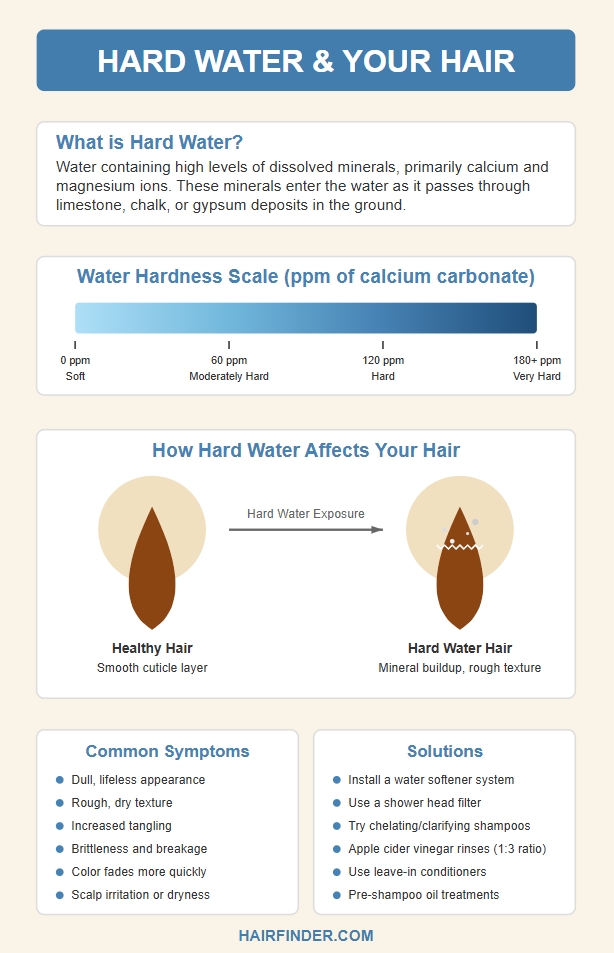Hard Water & Hair

What is hard water?
Hard water contains high levels of dissolved minerals, particularly calcium and magnesium. These minerals are picked up as water flows through geological formations such as limestone, chalk, or gypsum deposits. The presence of these minerals gives water its "hard" classification, which is typically measured in parts per million (ppm). Water hardness can range from soft (0-60 ppm) to very hard (greater than 180 ppm). The higher the concentration of minerals, the more noticeable the impact on daily life, including on your hair.
When washing hair with hard water, the minerals in the water interact with shampoos and conditioners, forming an insoluble substance that coats the hair strands. Over time, this mineral buildup can cause a number of problems. As minerals accumulate, they prevent hair from retaining moisture, making it more difficult for hydration to penetrate the hair shaft. This leads to various visible and physical changes to hair health.
The most noticeable effect of hard water is a loss of hair's natural shine. Hair may appear dull and lifeless, lacking the luster it typically has after a wash with soft water. The minerals can also make hair more tangled and prone to friction, increasing the likelihood of breakage and split ends. The buildup of minerals makes hair more brittle, and regular exposure to hard water can exacerbate this issue.
Additionally, if you have color-treated hair, you may notice that the color fades faster due to the minerals interfering with the dye's effectiveness. The scalp can also be affected, leading to dryness, itchiness, irritation, and worsening conditions like dandruff or seborrheic dermatitis.
Is hard water harmful to hair?
While hard water doesn’t permanently damage the internal structure of hair, its effects can lead to secondary problems. Mineral buildup increases the mechanical stress during brushing and styling, making the hair more prone to breakage.
The buildup also prevents moisture from being properly absorbed, leading to issues with hydration. Also, the residue left behind by hard water can reduce the effectiveness of hair care products, which may result in the overuse of shampoos and conditioners.
How can you tell if hard water is affecting your hair?
Several signs may indicate that hard water is affecting your hair. If your hair feels rough immediately after washing or if it’s difficult to create a good lather with shampoo, you might be dealing with hard water. Tangling and a visible white residue left on the hair after drying are also common indicators.
If your hair remains dull despite regular use of clarifying products, or if your color-treated hair fades more quickly than usual, hard water could be the cause. Additionally, if your styling products seem ineffective, it might be because the minerals in hard water are preventing them from penetrating the hair properly.

How can you address hard water hair problems?
There are several ways to address the challenges caused by hard water. The first step is to determine whether your water is hard. You can use a home water testing kit or contact your local water utility to find out the hardness levels in your area. White residue on faucets, shower doors, or dishes is another telltale sign of hard water.
Once you’ve confirmed that your water is hard, there are multiple treatment options available. One of the most effective solutions is installing a water softener system. These systems work by replacing calcium and magnesium ions with sodium ions, effectively reducing the hardness of water throughout your home. For a more targeted approach, you can install showerhead filters that specifically address the minerals in the water at the source, helping to minimize their effects on your hair.
When it comes to hair care, several products can help alleviate the impact of hard water. Chelating or clarifying shampoos, which contain ingredients like citric acid or acetic acid, are effective at removing mineral buildup. An apple cider vinegar rinse (diluted with water in a 1:3 ratio) is another effective remedy for breaking down hard water residue. Pre-shampoo treatments with oils can protect hair from mineral buildup, and leave-in conditioners with humectants can help combat dryness. Additionally, there are specialized hair care products designed to tackle the challenges posed by hard water.

Are there any benefits to washing hair in hard water?
While hard water is generally seen as a problem, there may be some benefits for certain hair types. The minerals in hard water can add volume to fine hair, and some people report that it helps control excess oiliness on the scalp. Hard water may also be less irritating for those with sensitive skin conditions, as it tends to be gentler on the skin's natural oils compared to soft water. However, these benefits vary depending on the person’s hair type and skin sensitivity.
By understanding how hard water affects your hair and implementing targeted solutions, you can protect your hair from its damaging effects and maintain healthy, vibrant hair.
©Hairfinder.com
See also:
Well water and hair problems
Hard well water and brassy looking hair
Highlights, well water and brassy hair